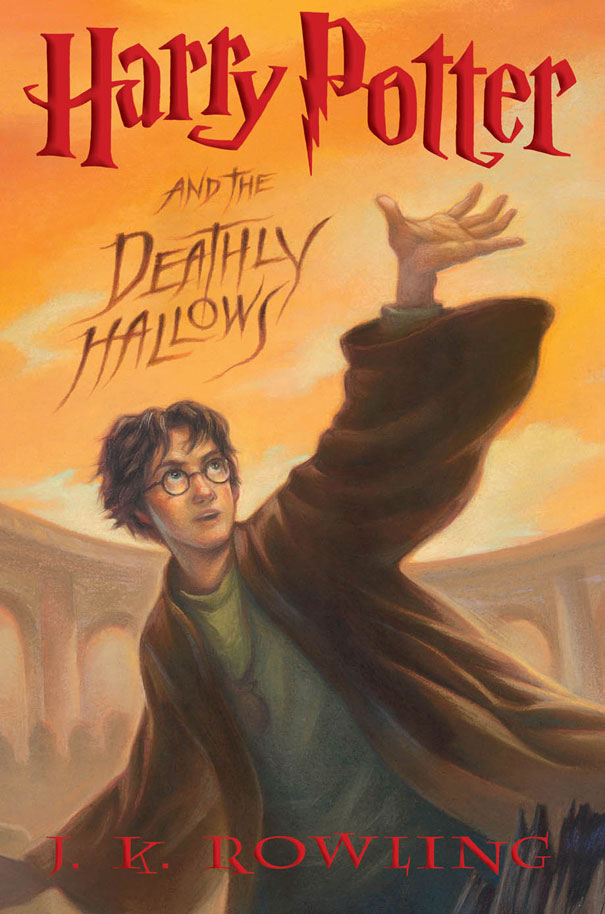Naturally, like most of the wizarding world, I spent Saturday deeply ensconced in Harry Potter and the Deathly Hallows, J.K. Rowling’s long-awaited final installment of the tale of the Boy Who Lived. And the verdict? Well, I enjoyed it, and I appreciate the degree of difficulty Rowling faced in closing this much-beloved tale. But, I’ll go ahead and put a word in for the muggle-hearted: It was easily my least favorite in the series (Put another way, it was the first book in seven where I started flipping forward every so often to see how much I had left, and the first where I found myself thinking the movie would assuredly be better than the book.) For obvious reasons, the rest of the discussion will involve spoiler-vision, so click the space below to highlight (and don’t click anything if you don’t want to know the end) [Update: Spoiler-vision turned off, now that the book has been out for awhile]:
* First off, I very much agree with this Laura Miller Salon review: I thought the book sorely missed the presence and the rhythms of Hogwarts. I get that Harry, Ron, and Hermione might have to break out of their safety zone to prosecute the war on You-Know-Who, but in all honesty, I didn’t find the wandering around the English countryside nearly as engaging as all the boarding school shenanigans that have marked the series in the past.
* The action scenes. I’ve complained as recently as my Order of the Phoenix film review that Rowling’s action sequences tend to be kinda clunky. Well, as befitting the last book in a seven-tome saga, there’s a lot of action in here, from escapes from the Ministry, Godric’s Hollow, Luna Lovegood’s house, and Gringotts to the final, climactic Battle of Hogwarts. And, most of it, in my humble opinion, didn’t really jump off the page. In a way, Hallows felt more like a screenplay treatment than a book, and, as I said, I expect the inevitable movie will make more of these myriad escape and battle scenes.
* The “homages.” Yes, all fantasy is derivative, often intentionally so. (As every fanboy and fangirl knows, Tolkien, Lewis, Lucas, and others all deliberately hearken back to collective myths in their writings and films.) Still, there was a lot in Deathly Hallows that felt lifted, from the very One-Ringish locket (As my sister wryly noted, it was “Share the load” all over again.”) to Harry’s Aslan-like sacrifice in the final battle, from the Sword in the Lake to Ma Weasley paraphrasing Ripley’s most memorable catchphrase from Aliens. Each time, it was pretty distracting.
* The fifth element is love? Ok, it’s been obvious it’s going this way for awhile now, but I still found it rather irritating. But that assuredly speaks worse of me than it does the books. Let’s move on.
* The deaths. As it turns out, my guesses about where this was all going turned out to be pretty on the money. (I’ve long been of the school that Snape was deep undercover, and — while I always thought Harry would end up losing his magic when he lost his horcrux/scar — my basic contention that he’d end up all grown up and outside the magical world of Hogwarts was somewhat substantiated by the epilogue.) But the deaths here…well, to be honest, they felt pretty arbitrary to me, as if Rowling wanted it both ways. None of the major characters (except Snape and Voldemort, both givens) ended up on the other side of the veil (even if Ron seemed a goner after leaving in a huff, and Hagrid’s been a one-trick-pony for at least five books now.) But Rowling pretty remorselessly cuts a swath through her supporting characters, including offing Hedwig, Mad-Eye, Lupin, Tonks, Colin Creevy, some random Muggle Studies prof, and, most shockingly for most, I’d guess, Fred Weasley. In short, all of these deaths seemed to me the equivalent of Haldir kicking the bucket in Lord of the Rings…a way of bringing the high stakes of death into the equation without it actually affecting any of the major characters. (Ok, Fred may be a Theoden level loss, but it’s a toss-up.) In short, the lack of major deaths, especially when compared to the catastrophic losses among the second tier, makes Hallows seem at once painless and bloodthirsty.
Not to miss the forest for the trees, I didn’t hate Deathly Hallows, and would still, without a doubt, number the series as a whole as a masterful work of children’s fantasy. (I’m not about to recant The Leaky Cauldron at this late date.) I do find myself wishing Harry’s final year at Hogwarts had taken a somewhat different direction. but it’d have been hard in any case for the seventh book to live up to the mighty expectations before it (although I actually found David Chase’s infamous Sopranos non-ending to be a more satisfying piece of pop culture closure.) Still, the surviving characters of Deathly Hallows — and especially J.K. Rowling — have more than earned a happy retirement. So, so long, y’all, and here’s hoping future Gryffindors are up to snuff.


Just finished HP7 last night… I agree w/ you. I was hoping Harry’s ending would be different than it was. I’m glad alot of my previous predictions ended up being correct. Remember when we chatted at the end of book six about RAB?